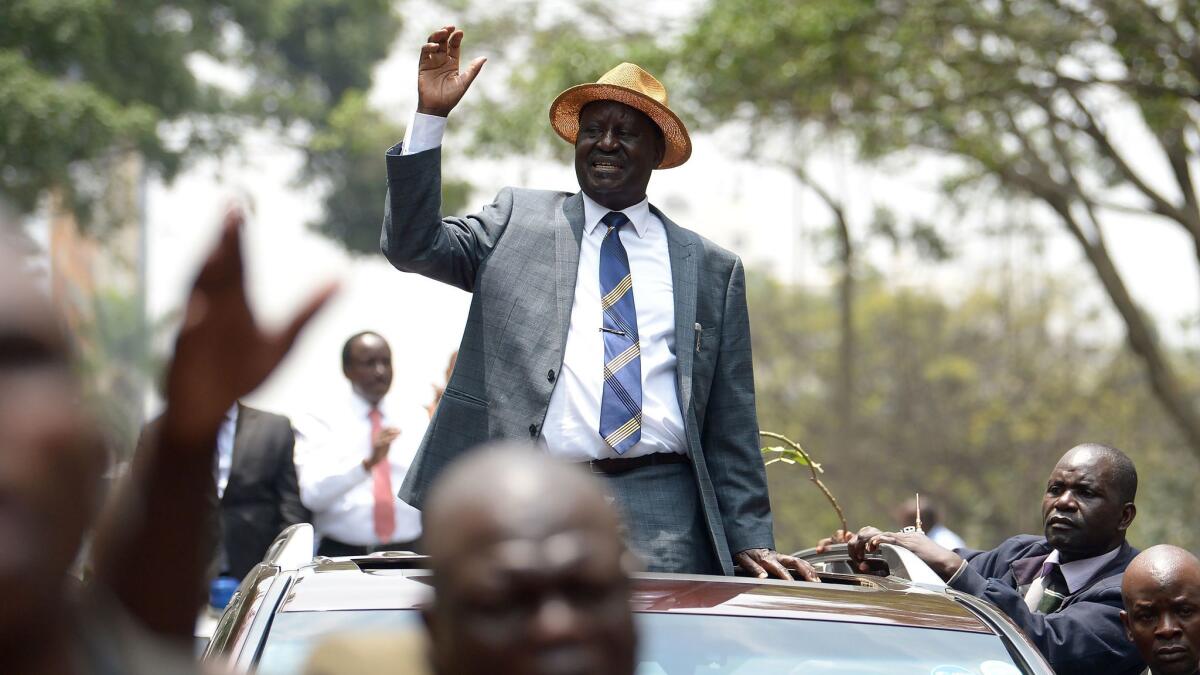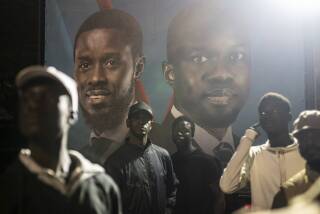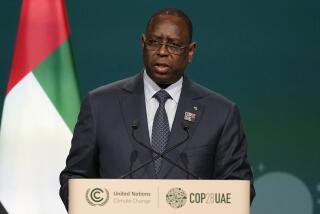Kenyan opposition leader pulls out of rerun election, claiming it lacks credibility

Kenyan opposition leader Raila Odinga on Tuesday pulled out of a rerun election scheduled for later this month, saying his party lacked confidence in the credibility of the process.
Kenya’s Supreme Court ruled the Aug. 8 presidential election invalid because the Independent Electoral and Boundaries Commission failed to follow the correct procedures laid down in the constitution and electoral law, ordering a repeat election be held.
The opposition has held repeated protest actions in recent weeks, claiming it has no confidence in the IEBC and calling for key officials on the commission to be removed.
“All indications are that the election scheduled for 26 October will be worse than the previous one,” Odinga said Tuesday.
He called for fresh elections in 90 days to allow time to ensure a credible election and he demanded nominations for the presidential race be reopened.
Odinga, head of the opposition coalition NASA, said the election due on Oct. 26 would not meet the minimum demands for a fair election called for by the opposition.
“We at NASA have insisted that the fresh election orders be held to the standard ordered by the Supreme Court, that is in strict conformity with the Constitution and written law,” he said at a press conference..
Odinga said the governing coalition Jubilee was arguing that any election would do, opposing reforms on the grounds there was insufficient time before the election.
“In a constitutional democracy we should not be debating about a free and fair election or compliance with court orders or accountability for breach of public trust. We should have been working together to ensure that we uphold these values as they are not only our national values but are also the foundations of a credible electoral system.
“After deliberating on our position in respect of the upcoming election, considering the interests of the people of Kenya, the region and the world at large, we believe that all will be best served by NASA vacating its presidential candidature in the election scheduled for 26 October 2017,” Odinga said.
Under a ruling by the IEBC, President Uhuru Kenyatta and Odinga were the only candidates allowed to contest the Oct. 26 presidential election.
Odinga said NASA would hold countrywide protests to support its call for a fresh election and reopened nominations within 90 days.
After Odinga’s withdrawal, the IEBC tweeted a letter dated Tuesday, saying that it was committed to delivering free and fair elections and had taken appropriate steps.
The commission said it was meeting with legal advisors to decide on the appropriate steps to take next. However the latest twist in an election which has already seen a string of legal challenges may trigger new legal action.
A Kenyan lawyer specializing in constitutional and human rights law, Nelson Havi, tweeted that a withdrawal in a repeat election should lead to a new election and fresh nomination of candidates.
But others suggested that the IEBC must declare President Kenyatta to be the winning candidate.
Since the Supreme Court decision to invalidate the election, President Kenyatta has called the Supreme Court judges responsible for the ruling “crooks” and threatened to “fix” them. He said Tuesday the elections would go ahead despite Odinga’s withdrawal, since Kenyans had a right to choose their leaders. He accused Odinga of wasting public money that had been spent to prepare for the repeat election.
The International Crisis Group, an independent analysis and research group concerned with conflict, argued recently that an opposition withdrawal from the repeat election could trigger a constitutional crisis and deadly new clashes between protesters and security forces.
At least 37 people, including seven children, were killed during post-election protests in August, according to a report this week from the Kenya National Commission for Human Rights. All but two of the deaths were caused by excessive use of force by Kenyan riot police, it found. At least 126 were injured.
The International Crisis Group said that if both sides were able to place representatives in the IEBC to observe all aspects of the process, it could be a compromise that may build confidence in the election.
“Even if the parties find a path to elections, the threat of violence afterwards, whatever the outcome, is high. A firmer stand by Kenyan leaders against hate speech and pledges to campaign peacefully and take any complaints back to the courts after the vote would go some way to lower the temperature,” the organization argued.
Twitter: @RobynDixon_LAT
UPDATES:
9:45 a.m.: This article was updated with comments from opposition leader Raila Odinga and additional details.
This article was originally published at 7:25 a.m.
More to Read
Start your day right
Sign up for Essential California for news, features and recommendations from the L.A. Times and beyond in your inbox six days a week.
You may occasionally receive promotional content from the Los Angeles Times.






